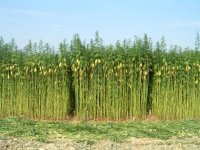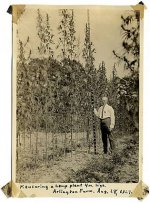CaptainDankness
Well-known member
I don't know, but I believe they will GMO the crap out of the strain game. They will GMO and make it so it can't be pollinated/crossed/worked.
It will take a lot of bullshit story telling for them to buy off peoples opinions. Making everyone that does it the natural way, 'look crazy'.
It's already happening at least pharmaceuticaly. Veritas Pharma looks like they're on top of the game, besides GW Pharmaceuticals.
. Intellectual Property Strategy
• Examples of plant cultivar protection include:
– Plant Breeders’ Rights Act in Canada1
– Patent Act protection for fully described and validated new uses of
specific cultivars for specific medical conditions, especially for those
strains previously recognized as being effective, or with new strains
of cannabis obtained by genetic engineering2
• Expanding IP strategy to world-wide patents
Sources: (1)
. Continue obtaining varied cannabis cultivars and carry them through the research
process
• Determine potential cultivars for clinical testing
• Continue pursuing to become a License Producer under ACMPR
• Prepare patent applications based on results.
• Dec. 2017 – Obtain a Health Canada dealer’s production license through Cannevert
so as to produce extracts and import/export cannabis varieties for research
purposes as well as provide analytical services for licensed producers
• Dec. 2017 – Feb. 2018: Complete human trial of lead strain for pain
• Feb. 2018: Provide industry setting standards for medicinal cannabis
• March. 2018: Establish delivery and dosage optimizations
All the doctors, lawyers and money involved I don't really believe recreational marijuana is going to actually happen. Jeff Sessions don't make me feel any better as well.
The full investors presentation is here on PDF.
http://veritaspharmainc.com/investors/presentations/
I first stumbled upon Veritas Pharma because they obtained the first USPTO patent on a marijuana cultivar. They certainly have some big goals and pretty interesting other than the fact they are trying to dominate medical marijuana along with GW Pharmaceuticals, Bayer (owners of Monsanto) and a few others as well.
Crazy what big money can and will do to marijuana.
Of course we can keep growing and breeding illegally like most of us have been for some time now. Though so many people didn't even start growing until the state laws allowed them to. I remember way back a bit of people would talk shit about people for breaking state laws because they were legal in California. Lol, like yeah, fed law trumps state law. Lol
But all we can do is breed our own and hope for the best, while being prepared for the worst.

 keep your chicken shit posts off here
keep your chicken shit posts off here 


